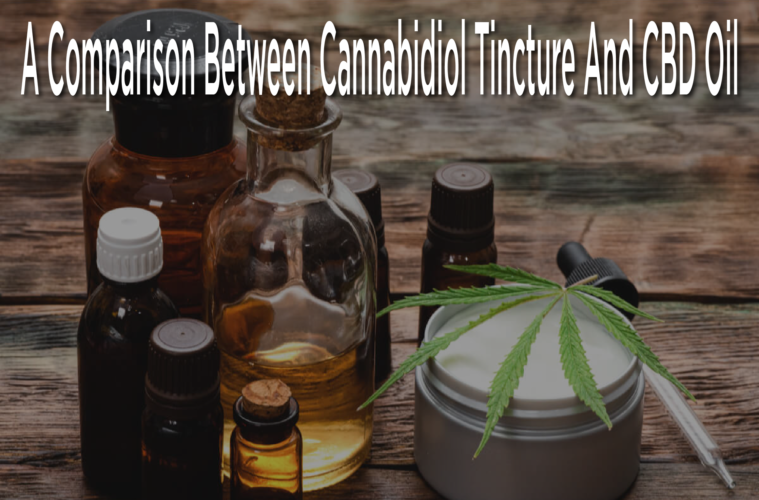View the original article about A Comparison Between Cannabidiol Tincture And CBD Oil at How To Buy CBD Oils.
Cannabidiol is a chemical compound present in industrial hemp. CBD has many different therapeutic and medicinal properties and it lacks mind-altering effects, so it is popular among cannabis users. Many different forms of cannabidiol are available in the market, including the oil and the tincture. Many individuals assume that CBD tincture and oil are one and the same, but there are some notable differences between both. The main distinction is in the things these contain.
How you ingest the hemp-derived substance into the body will play a role in how it works. Every single method of CBD ingestion has its own benefits and disadvantages. Here, we will look at two products namely cannabidiol oil and cannabidiol tincture that can be consumed in two different ways.
What Is Cannabidiol Oil?
To make it, CBD is first extracted from industrial hemp. After that, the substance is added to a base oil or carrier oil. It will carry cannabidiol and other hemp-derived substances if any into the body, hence the name ‘carrier oil’. Cannabidiol is mixed with it to make it better absorbed into the digestive system.
The most powerful and the priciest form of cannabidiol is oil. It contains protein, nutrients, essential vitamins, fatty acids, and phytocannabinoids. You will be able to take it into the body by swallowing or use it topically.
Research shows that cannabidiol interacts with cannabinoid receptors present throughout the body, as part of the human endocannabinoid system. The ECS is responsible for improving the metabolism, pain, mood, immune system, cognitive and cardiovascular functions. Cannabidiol oil is very powerful, so just 2 or 3 teaspoons of it will suffice for a day’s consumption. Even so, the precise dose of CBD can differ by the user’s body weight and other factors.
What Is In CBD Oil?
The main ingredient of it is hemp extract, carrier oil, and flavor. The carrier oil can be olive oil, coconut oil, hemp seed oil, or MCT oil. It can also have an artificial/natural flavor, although flavorless options are out there. The carrier oil facilitates the absorption of cannabidiol into the human body.
What Is CBD Tincture?
Both CBD oil and the tincture are derivatives of industrial hemp. In other words, these are products derived from the aforementioned plant of the cannabis sativa genus. The term ‘tincture’ refers to a medication stored in an alcohol setting, but in the case of cannabidiol, it is something different. To derive a tincture, hemp is soaked in a water and alcohol solution.
CBD tincture can be consumed through the tongue by using a dropper. You can just fill the dropper with the liquid product and put some drops of it under the tongue. After that, you will have to hold the tincture there for a minute before swallowing. You can also consume CBD oil in an aforementioned manner. This is why many confuse standard CBD oil with cannabidiol tincture.
Although the two products are consumable sublingually too, the ingredients of both are different. When it comes to cannabidiol tincture, the ingredients are hemp extract, water, essential vitamins, herbs, sweeteners, melatonin, and essential oil.
Another difference between the two is that the strength of cannabidiol in the tincture is lower than that of CBD oil. Besides, the tincture remains usable or suitable for consumption for longer than the oil because the former is made with isopropyl alcohol or ethanol. Isopropanol or ethyl alcohol serves as a substance that preserves it against decay.
If you see something foggy or cloudy in your CBD oil product bottle, the item is likely expired. To prolong a CBD product’s life, you should stop it from having direct contact with the sunlight.
Is there a specific CBD dosage that applies to all users? To cut the long story short, no. The dose of the tincture or oil differs by each user. The ideal dose for you may not be so for someone else.
Some individuals do not prefer the taste of CBD oil when swallowed. Those users describe the taste as ‘earthy’, and they say that it has an oily aftertaste. On the other hand, tinctures are available in a flavorless form, plus various flavors, including vanilla, peach, and chocolate.
The potency, the method of cannabidiol extraction involved in manufacturing, and many other things contribute to the rate of a CBD product. CBD oils and cannabidiol tinctures come under the same approximate price range, but the former is pricier than the latter products.
Final Thoughts
So are you wondering about which product to choose from these two types of cannabidiol? There is no right or wrong answer in this regard. It is your personal choice, but some of the aforementioned factors may tilt your decision in the favor of one product or the other. For instance, maybe you wish not to pay those few more dollars to buy CBD or have any aftertaste.
Learn more about CBD Oils at How To Buy CBD Oils.
Advertising disclosure: We may receive compensation for some of the links in our stories. Thank you for supporting Irvine Weekly and our advertisers.


